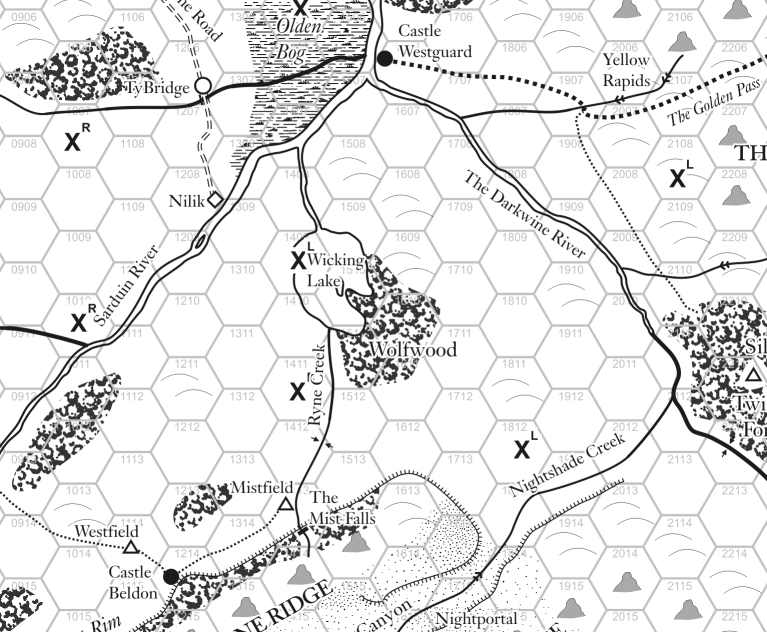robertsconley
Hero
I can't help but feel constrained by limiting my campaign to one setting and having to shoehorn adventures and material into it.
I am trying to solve the problem with a new Goodman Games product called Points of Light. One of the reason Joseph Goodman went for is how I presented Points of Light and how it can be continued indefinitely if he chooses to make into a line of products.
http://www.goodman-games.com/4380preview.html
Basically Points of Light is a gazetteer for four lands. It is 48 pages and will sell for $12.99. Each land has a map with numbered hexes. I chose not because I have fetish for old school style but I feel that it is the most compact form for conveying a lot of information about an area.
Each area has a series of locales keyed to the number of hex grid. In addition any multi-hex geographical feature is listed along with any specialized entry unique to the area.
Each area is designed to drop into a referee's campaign with minimal work. Each area is designed so that it has useful material that fleshes out another area. So if you use just Borderlands the remaining 3 lands will have entries of use. However is not in the form of a campaign world but more that each area shares common concepts.
Like the God Sarrath appears in three area, the Bright Empire in a different set of three. This was done to maximize the use of 48 pages.
What stat there are are generic and usable for any edition of D&D and most fantasy RPGs. In a setting type product you don't have a lot of space for stats anyway.
Example Entry
0913 Sam’s Landing (Hamlet)
This small hamlet of mud huts is the marshalling area for Baron Beldon’s raids on the trade caravan passing between Westguard and Bolzak. There are usually several dozen canoes and a handful of barges pulled onto shore at any time. In the center of the hamlet is the Green Frog Inn, where Tom Lodon (Rog6) rules the thugs and pirates of Sam’s Landing with an iron fist. Nailed to a post next to his “throne” is the shriveled head of Sam Dalton, the former chief of the hamlet. Over 40 pirates and raiders live in the hamlet, along with a dozen women, and twenty slaves to tend potatoes patches. A good portion of the crop is used to brew Silver Lightning, a type of hard liquor. A dozen wererats (1 HD) live on the outskirts of town and are used as scouts on raids.
The four areas
Each land is about 125 miles by 100 miles. They are provided with a minimal background to make it easy to add it to any referee's campaign.
The four lands presented are
Wildland: The fall of the Bright Empire left warring factions in its wake. As savage barbarians and wicked humanoids roam the land, the last bastions of civilization cower behind their crumbling city walls. A dark age has come, and none may live to tell the tale.
Southland: On the frontiers of the Great Kingdom, the nations of men, elves and dwarves join together against the wicked elves of Nighportal Keep and the Orcs of the Bloody Fist. A realm is yours for the taking, if you can carve it from the wilderness.
Borderland: Two factions clash over war-torn fields, battling for dominance in a civil war that that has torn a once-mighty empire in two. When brother strives against brother, and blood runs in the streets, who will emerge to unify the broken land -- and at what cost, peace?
The Swamps of Acheron: In the Outer Planes, amid fetid swamplands and ice-choked mountains, the fell god Sarrath holds court. In a realm where gods stalk the earth, will you dare to take a stand, or will you succumb to evil's siren song and take up the Serpent Banner?
A portion of one of the four maps. A fuller preview will posted closer to release

Hopefully my Points of Light won't kill the setting but give it a new rebirth by providing a multitude in a useful format.


